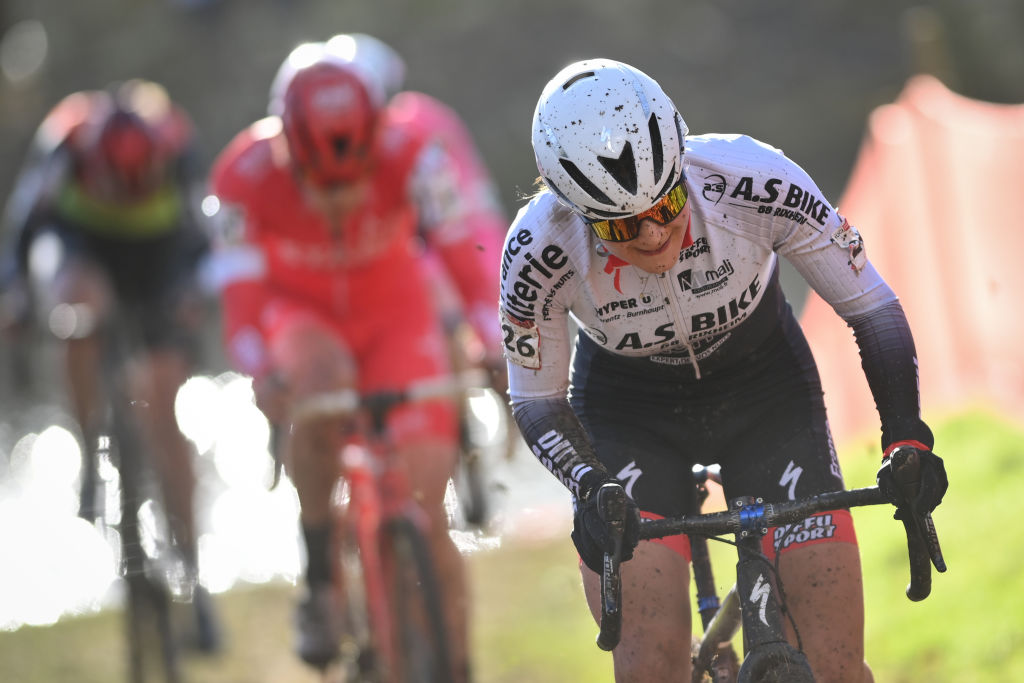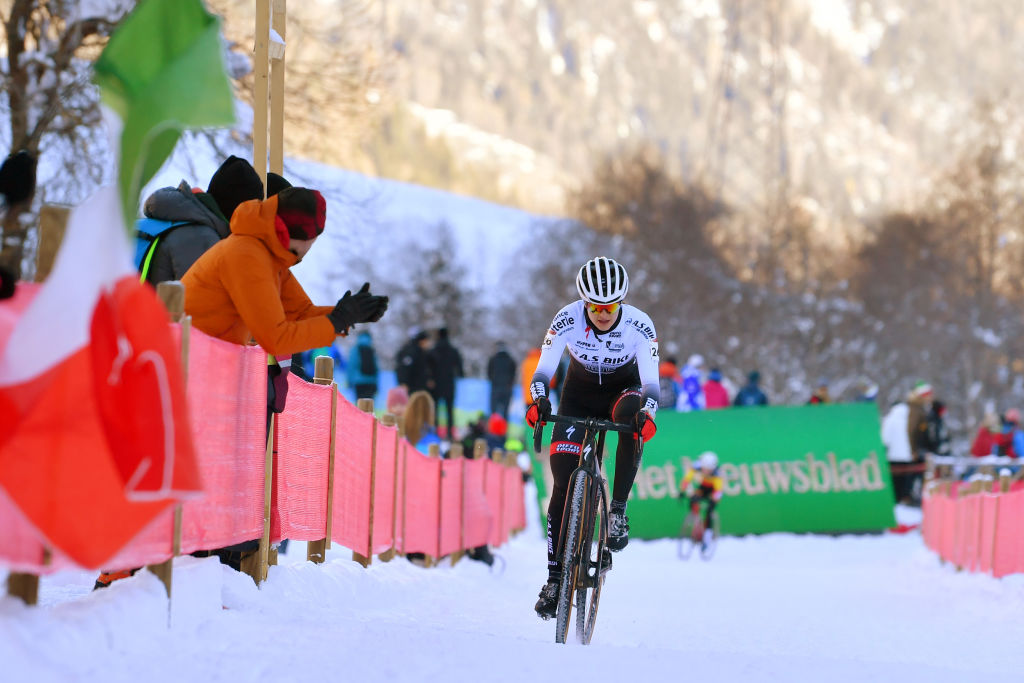Introducing: Hélène Clauzel
French rider feeling motivated ahead of World Cyclocross Championships following top-10 finish in UCI World Cup series

France’s Hélène Clauzel first lit up the scene when she came second at the 2016 Cyclo-cross World Championships in the junior category. Coming from a cycling family and following in the wheel tracks of older sister Perrine, who has excelled in mountain biking and cyclo-cross, the 24-year-old has steadily built on her progress, with the current season being her best yet.
After starting the cyclo-cross season with two seventh place finishes stateside at the World Cup races in Waterloo and Iowa City, six seems to have become Clauzel’s favourite number in Europe after she gained sixth-place finishes at the World Cup races in Val di Sole, Namur, and Flamanville. Additionally, the Alsatian crossed the European Cyclo-cross Championships in….you’ve guessed it, sixth place.
At the French National Championships, the rider from AS Bike Crossteam fought hard to claim victory in the mud bath at Liévin, Northern France but disappointingly finished second behind her junior teammate Line Burquier.
However, Clauzel, who celebrated her 24th birthday this week is feeling positive and motivated in the run-up to the World Championships, at Fayetteville, USA, after ending the World Cup series competition in ninth place.
Cyclingnews: How did you get into cycling?
Hélène Clauzel: I started when I was six-years old as my dad was in the local club, Velo Club Sainte Croix en Plaine, where I am currently a member. He did road cycling and when my sister become big enough to do cycling it wasn’t really possible to go on the road. In fact, my club didn’t have a mountain biking section. So my dad and the president of the club decided to set up a mountain biking club for youngsters. So when I was old enough, I naturally joined the club and we cycled in the Vosges, just 500m from our home near Colmar.
CN: What is it like being in a cycling family?
Get The Leadout Newsletter
The latest race content, interviews, features, reviews and expert buying guides, direct to your inbox!
HC: Both my parents are so engaged in cycling that neither I nor my sister would have reached our level if it hadn’t been for them. So we talk a lot about cycling. It’s our life, our passion. Cycling has formed an integral part of our weekend since childhood, and I feel lucky to have parents who have given me so much support. Sometimes in the middle of a family meal, my parents will switch on the TV to watch a World Cup race that my sister and I were competing in. They’re really proud of us and we try to do our best for them – though they are not pushy parents!
CN: Is there any sibling rivalry between you and Perrine?
HC: With us being on the same team, and both going to the World Cup cyclo-cross races, we are always together at the weekend. We’ve never really had any rivalry. Perrine is four years older than me and was very strong when she was my age. She has competed in the Olympic Games, she’s been European Mountain Bike Champion, and has a palmarès that I don’t have. Perrine is in the second half of her career whereas I am more at the beginning of my career. We help each other to succeed, and when we are at the same races, we do what we can to encourage one another on the day.
CN: What’s been your best performance so far this season?
HC: I must say Namur, where I came sixth. It’s a course that I particularly like because it suited me as a mountain biker, given how technical it was. It was one of my big objectives of the season, so to achieve a good result over there was really great.
CN: What was it like racing in the snow at Val di Sole?
HC: The terrain was completely different from what we race on normally. It’s not the same technique as riding through sand, or mud, but I really liked it. I found it fun because it broke the rules and the routine of cyclo-cross.
The ruts in the snow are very hard compared to those in the mud. If you get into one you struggle to get out of it, so you really need to be skillful on your bike. Also, when racing through the mud, you generally try to find the grass to ride over – areas where there is less mud. But in the snow, you can’t do that, as everything looks the same, all white. The snow in the light makes it really difficult to distinguish differences in the terrain and see the ruts, so that can really throw you and catch you out.

CN: French women are prominent in mountain biking, but less so in cyclo-cross. Why do you think that is?
HC: In France, women who do mountain biking are a little reticent about doing cyclo-cross. Pauline Ferrand-Prévot was the cyclo-cross World Champion, but she ended up stopping cyclo-cross because it was difficult to manage both, and as a result she stopped cyclo-cross in order to be fully dedicated to mountain biking. Loana Lecomte doesn’t do cyclo-cross at all because she doesn’t like cyclo-cross enough to do it alongside mountain biking.
I think it’s also because French women gravitate towards road racing, and road racing teams prefer the women to spend the winter doing specific road race training. During that time, the teams are on various training camps, so the teams aren’t keen for their athletes to be going away to race cyclo-cross.
CN: So how do you manage cyclo-cross and mountain biking?
HC: Well, I try to give myself a proper break between the mountain bike and cyclo-cross seasons to allow my body to get fully recover, but it hasn’t been easy. Now that I have changed teams and am in the same team for mountain biking and cyclo-cross it will be a lot easier to manage. I really have to be careful to get proper rest between the seasons, as well as a short break during the cyclo-cross season in December, before attacking the final races of the season.
CN: Which do you consider yourself to be first? A cyclo-cross rider or a mountain biker?
HC: Mountain biking is my main discipline, though yes, I do a fair bit of cyclo-cross. With the upcoming Paris Olympics the mountain bike race is an objective I have in the back of my mind. However, with France being one of the leading nations for mountain biking, it will be very hard to qualify as the level is high, especially with having people like Pauline, Loana, and Lena Gerault.
CN: Who inspires you in cycling?
HC: In cyclo-cross it’s Marianne Vos. She is the mother of all cycling, and has won everything. She has a way of weaving so smoothly through the race when she races cyclo-cross. Marianne is a phenomenal, inspirational racer, and anyone who achieves even a fraction of what she’s won would be doing well.
In mountain biking, it’s Jolanda Neff and Evie Richards. Jolanda comes across as very gentle, but during a race she is a real fighter who doesn’t give up until the end. We saw how she raced while with a broken hand during the World Cup at Leogang, but still competed fiercely while shouting in pain during the race; then she became Olympic Champion a couple of months later. Jolanda has got such a strong character. It’s so impressive.
I also find Evie Richards very interesting. She comes across as playful and frolicky outside of races, especially when you see her social media, but during a race she is extremely tenacious and focused. She seems to have a real joie de vivre and lives life to the full.
CN: What do you think of the World Championships course at Fayetteville?
HC: I didn’t get the chance to recon the course while we were in the States for the World Cup races, as we felt, as a team that it was too far away and too tiring to combine it with the racing. I think it could be a fast, rolling course in the dry, but the weather conditions could quickly change the circuit if it rains.
The particularity of this course is that the race is based around a long flight of 38 steps, which will make it a physically demanding course. Also, as I like running, the long flight of steps could play to my strengths. Apart from the National Championships, I am pleased with how I have raced this season, and I think my results augur well for the World Championships.
CN: What do you think of the level in women’s cyclo-cross racing?
HC: Well, Marianne Vos and Lucinda Brand are head and shoulders above everyone. After that we are seeing the emergence of really strong under-23 riders like Puck Pieterse and Fem van Empel who are winning World Cup races at the age of 19, and that’s really exciting to see. It’s true that in cyclo-cross the Dutch are dominant, and one could say that winning the Dutch National Championships is almost like winning the World Championships! Having said that, I still think that the Dutch are beatable, and other comparatively smaller nations shouldn’t feel embarrassed or intimidated by them. It’s for us to forge our own paths, flex our muscles and put ourselves in the mix.